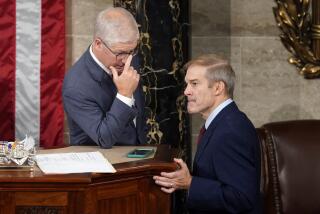After filibuster rule change, more delay tactics bog down Senate
WASHINGTON — Republican resentment over the Democrats’ decision to change Senate rules and eliminate filibusters on nominations has led to a form of trench warfare in the already deliberative body, producing long hours and hard feelings as the Senate finishes the first week of life with its new rules in place.
Democrats, after an all-night session that continued uninterrupted Thursday, said the marathon schedule was a small price to pay.
Two new judges are now set to join the influential U.S. Court of Appeals for the District of Columbia Circuit, giving Democratic appointees a majority on the court. President Obama can enact long-sought changes in housing policy with the confirmation of Melvin Watt as director of the Federal Housing Finance Agency. Other key sub-Cabinet vacancies are on track to be filled between now and Christmas, although Senate Majority Leader Harry Reid (D-Nev.) has warned that lawmakers may have to work right up until the holiday.
Asked whether Republican delaying tactics had produced even a hint of regret, Sen. Jeff Merkley (D-Ore.), one of the leaders of the anti-filibuster effort, scoffed.
PHOTOS: The battle over Obamacare
“Have you been paying attention the last five years? This place had been paralyzed,” the first-term lawmaker said. “Now you’re seeing that we’re actually getting some things done.”
But they’re getting done slowly.
Democrats can advance nominees by a simple majority vote, but Republicans are using all the mechanisms they can to deliver retribution, delaying votes for hours and objecting to the typically pro forma procedural steps that allow the Senate to function.
The Senate’s rules still can require an initial procedural vote before a final confirmation vote. When that procedural hurdle is overcome, the rules require up to 30 hours of debate before a final vote. As a courtesy, both parties often come to informal agreements to waive some or all of that time. Republicans now are in no mood for such courtesies.
So, starting Wednesday night, Reid held the chamber open so he could call votes immediately when the time for debate expired on each of a long list of pending nominations. Lawmakers face what for them amounts to a hardship: a Friday session and possibly another Saturday.
Sen. Roy Blunt (R-Mo.) said it was “perfectly reasonable” for Republicans to insist on using all the time allotted for debate. Rather than discuss the merits of the nominees, Republicans have spent their time attacking the president’s healthcare law or criticizing the rule changes, calling them an assault on minority rights the Senate was designed to protect.
“It’s an attempt to shut out the American people from the political process,” Sen. Mike Lee (R-Utah) said in a speech at 3 a.m. Thursday. “President Obama and the majority party in the Senate are so dedicated to enacting their progressive agenda, they’ll do anything, even if it means running roughshod over the minority.”
PHOTOS: 2013’s political moments
Another tactic surfaced this week. Democrats were forced to cut short the confirmation hearing for Obama’s nominee to be the next Internal Revenue Service commissioner after a senator, anonymously, objected to waiving a rule that prohibits committees from meeting for longer than two hours after the full Senate has been in session. Typically, that rule is waived by unanimous consent.
Sen. John McCain (R-Ariz.), who worked throughout the year to find compromises that would prevent a change in filibuster rules, said his party would be looking at tactics beyond those being taken this week.
“The resentment on the part of Republicans is deep and long-lasting,” he said. “There will be many ways to manifest this anger, and believe me, it will be manifested.”
McCain also lamented that the bipartisan relationships that were part of the fabric of the Senate might be “broken.”
“We will continue to act for the good of the country,” he said. “If that means at times we need to negotiate with Democrats, we will do that because that’s our first obligation.”
Reid offered no apology. “I understand that the Republicans are still upset that Democrats moved to alleviate the gridlock in Washington,” he told reporters. “I can’t wave a magic wand and heal hurt feelings, but I can appeal to my colleagues to be reasonable and work with us to schedule votes in a timely manner.”
Most senators, of course, do not hang around in the wee hours after casting votes. Some Senate staff and security officers had to, as did a succession of junior Democrats who took shifts in the chair as presiding officer.
“About to take the 3-5 a.m. shift,” freshman Sen. Christopher S. Murphy (D-Conn.) posted on Twitter on Thursday. “Need an amendment to Senate rules allowing Red Bull on dais.”
More to Read
Start your day right
Sign up for Essential California for news, features and recommendations from the L.A. Times and beyond in your inbox six days a week.
You may occasionally receive promotional content from the Los Angeles Times.







